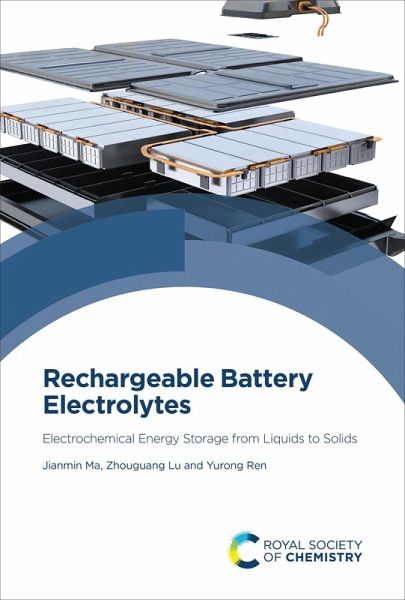
Rechargeable Battery Electrolytes (eBook, ePUB)
Electrochemical Energy Storage from Liquids to Solids
Versandkostenfrei!
Sofort per Download lieferbar
202,95 €
inkl. MwSt.
Weitere Ausgaben:

PAYBACK Punkte
101 °P sammeln!
Rechargeable batteries are one of the crucial ways we are going to solve the sustainable energy crisis. Lithium-ion batteries have been commercialised and are heavily relied upon, however, the scarcity of lithium resources increases the production cost and hinders further application. Additionally, the toxic and flammable electrolyte brings many potential safety hazards including environmental pollution. Looking for low-cost, safe, and environmentally friendly alternatives to LIBs has become a valuable research direction.The modification of batteries is focused on the anode, the cathode and el...
Rechargeable batteries are one of the crucial ways we are going to solve the sustainable energy crisis. Lithium-ion batteries have been commercialised and are heavily relied upon, however, the scarcity of lithium resources increases the production cost and hinders further application. Additionally, the toxic and flammable electrolyte brings many potential safety hazards including environmental pollution. Looking for low-cost, safe, and environmentally friendly alternatives to LIBs has become a valuable research direction.
The modification of batteries is focused on the anode, the cathode and electrolyte. Globally, researchers have moved onto new rechargeable batteries based on multivalent metal ions which have been extensively studied, including K+, Ca2+, Mg2+ and Al3+. However, the electrolyte is a very important component of a battery as its physical and chemical properties directly affect the electrochemical performance and energy storage mechanism.
Finding and selecting an appropriate electrolyte system is a crucial factor that must be taken into account to make these post-lithium-ion batteries commercially viable. Until now, it has been challenging to develop a suitable electrolyte with a wide electrochemical stability window and stable anode interface.
This book covers all the major ion-battery groups and their electrolytes, examining their performance and suitability in different solvents: aqueous, non-aqueous, solid gel and polymer.
It is suitable for all levels of students and researchers who want to understand the fundamentals and future challenges of developing electrolytes.
The modification of batteries is focused on the anode, the cathode and electrolyte. Globally, researchers have moved onto new rechargeable batteries based on multivalent metal ions which have been extensively studied, including K+, Ca2+, Mg2+ and Al3+. However, the electrolyte is a very important component of a battery as its physical and chemical properties directly affect the electrochemical performance and energy storage mechanism.
Finding and selecting an appropriate electrolyte system is a crucial factor that must be taken into account to make these post-lithium-ion batteries commercially viable. Until now, it has been challenging to develop a suitable electrolyte with a wide electrochemical stability window and stable anode interface.
This book covers all the major ion-battery groups and their electrolytes, examining their performance and suitability in different solvents: aqueous, non-aqueous, solid gel and polymer.
It is suitable for all levels of students and researchers who want to understand the fundamentals and future challenges of developing electrolytes.
Dieser Download kann aus rechtlichen Gründen nur mit Rechnungsadresse in A, D ausgeliefert werden.













